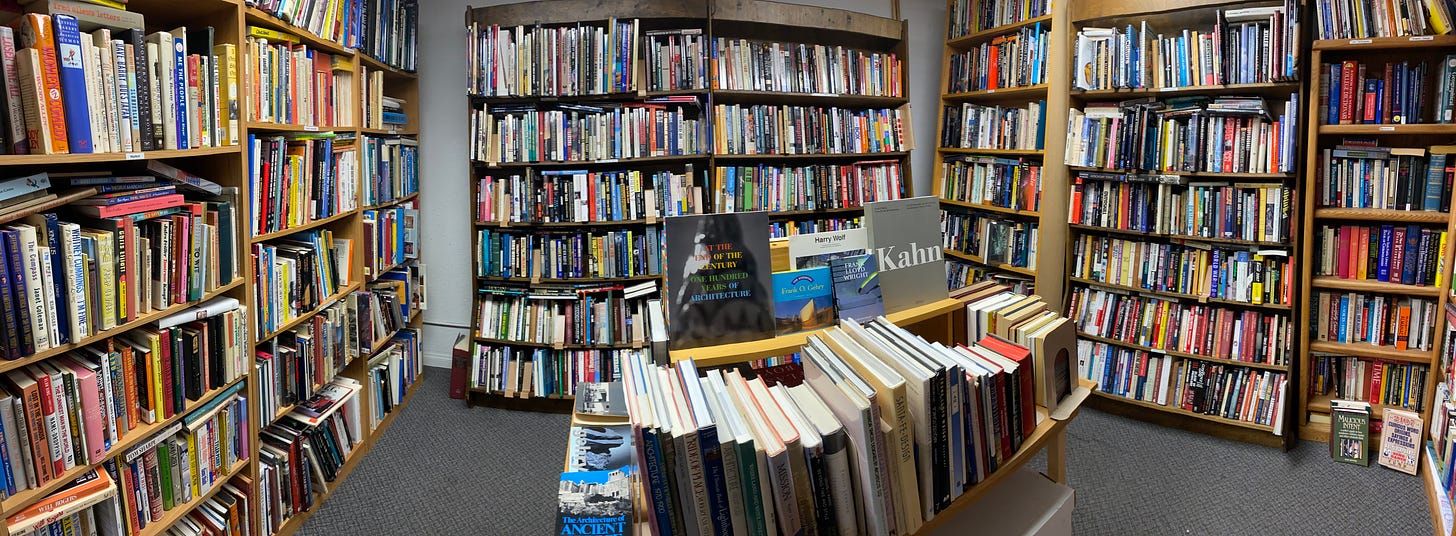What's the deal with history?
Welcome to Situation Normal, a weekly newsletter of slice of life stories! If these stories bring you joy, make sure you’re subscribed, and please tell your friends.
The man browsing in the history section has a bone to pick.
“You know what pisses me off,” he tells proprietor of the store, “all these books about the SS, but very few books about the NKVD.”
The proprietor shrugs. The Second World War ended 76 years ago. Also, the proprietor of a used bookstore isn’t a publisher; he has no say over which secret police organizations of WW2 authors write about. But the man browsing in the history section is Russian, and even though the SS and the NKVD were both horrible, a strange kind of patriotism is at work here, or so it would seem.
“The NKVD was just as evil as the SS, but no books,” the Russian man says. “You don’t fuck with the NKVD.”
You don’t fuck with the SS either, I want to say. But I’m in the mystery section, and apropos of my location, it’s a mystery to me why some books sell and others don’t. Maybe it comes down to this: the winners write history, but not all winners get a book deal.
But history is so yesterday. Live in the now! Isn’t that way they say? Time for an unsolicited geopolitics lightning round, Russian bookworm-style.
The U.S. has “big problems” because of China
But China also has “big problems” because nobody wants them to rule the world
The world has “big problems” for a myriad of complex reasons that go unspoken
If the Russian bookworm were to give a TED Talk, I suspect he’d call it Big Problems.
But who has time for a TED Talk? Outbursts concerning history and geopolitics were the the opening gambit. The Russian is a capitalist. He’s here to make a deal.
“How much you give me for these books?” the Russian asks.
The proprietor looks at the books the Russian brought in to sell. During the history lecture and the geopolitics lightning round, the proprietor quietly divided the Russian’s offerings into two piles: buy / pass.
“I can give you $85 for these,” the proprietor says after some quick math.
“You forget I was in book business many years,” the Russian counters. “That offer is joke, but not funny joke.”
I look in the direction of the humor section. The Russian is right. Nobody is laughing.
“How about $90?” the proprietor asks.
“You know I am sick man. Heart condition. Diabetes. Bad liver. Kidney problems. My joints are breaking apart. And these damn headaches the doctors don’t know anything about. I’ll be OK, don’t worry. But I cannot work. So, I sell my books. You buy these ones about the NKVD, too. You don’t have these. Buy them.”
The Russian wants $200 for everything.
“I can’t sell those NKVD books.”
“Why not?” the Russian asks.
“Not much interest in Soviet history.”
“But it’s World War Two,” the Russian says. “You have big World War Two section.”
“Books about Americans sell best.”
“Yes, America is self-centered.”
“Maybe so. What can I say? People want to read about their own country.”
“What about the books about the Germans and the Japanese?”
“After reading about their own country, people want to read books about their enemies.”
“We were allies. World War Two was won with Russian blood.”
“No argument there,” the proprietor says.
“You have British books.”
“You know how many Americans are Anglophiles? A lot. At least once a day, someone comes in here asking if we have books about British history. I have ten customers who will buy anything about Churchill. Doesn’t matter if the book is in poor condition, if it’s about Churchill, they buy it.”
The Russian makes a disdainful, guttural sound. The man is no Churchill fan.
“I can’t sell the Russian NKVD books. Sorry.”
“Why?”
“Most people haven’t heard of the NKVD,” the proprietor says.
“Yes! If they read the book, they learn about NKVD, buy the next book. You see how it goes?”
It’s a classic chicken-and-egg problem. Or, is it a PR problem? I’m not sure. I just hope it isn’t a “big problem,” the kind that might threaten to turn this peaceful used bookstore into a theater for global conflict.
“Make fair offer for NKVD books,” the Russian says. “I can be reasonable.”
They haggle some more. The highest the proprietor will go is $120. The lowest the Russian will go is $160, but there’s a sticking point. The deal must include at least two NKVD books, the Russian insists.
“Tell you what,” the proprietor says. “I’ll give you $130 and I’ll take one of the NKVD books. If it sells, I’ll call you to bring the rest and we’ll call the total $150.”
“OK, deal.”
It’s a far cry from the 1945 Yalta conference, where FDR, Churchill, and Stalin hashed out the post-war order, but the bookstore proprietor and the Russian have a deal! And maybe now that tensions have eased and big problems have been averted, the bespectacled beardo camped out in the mystery section can make his purchases.





